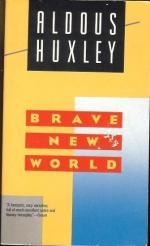|
This section contains 647 words (approx. 3 pages at 300 words per page) |

|
Brave New World is actually … a satire not so much of the future as of the present: of the future as it is implicit in the present. Huxley resorts to future remoteness for the same reasons that other Utopian satirists had earlier resorted to geographical or past remoteness (e.g. More, Swift or Anatole France): in order to gain the necessary distance and detachment to more effectively satirize the present. Huxley's satirical point in this novel is that if the present continues to "progress" as it is "progressing" now, then the inevitable result must be a brave new world. (p. 451)
That the United States is the present model for Huxley's vision of the future emerges even more clearly from an essay entitled, "The Outlook for American Culture, Some Reflections in a Machine Age," published in 1927. Huxley begins this essay with the observation that "speculating on the American future...
|
This section contains 647 words (approx. 3 pages at 300 words per page) |

|


